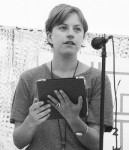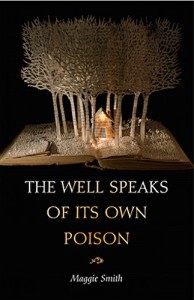Allison Carter explores echoes and space, calling them ghosts, while poet Maggie Smith creates fables for contemporary readers.
In her latest poetry collection Here Versus Elsewhere, Allison Carter tackles the idea of ghosts, not in the conventional understanding but in the sense of echoes of spaces or white space, the ghosts of what has happened that continue to shape the experience of the here and now.
Experimenting with both length (some long, some short) and form (one is entirely prose poems), Carter explores these ghosts of sound and shape in 49 poems. One example is “Intimacy, These Days, ” and watch how her effective use of repetition creates echoes.
Familiar as the back
wall of a cat’s eye
Familiar as the eyesight of the gentle fish
in the fish fountain
and its orange perception of the sky
through the ceiling of air
The rope that chafes hangs
from real stomach to real stomach so
My expectations of knowing are scaling back
scaling back
My expectations of making love are scaling back
scaling back
My expectations of speaking out are scaling back
scaling back
My expectations of dreaming are fading to black
fading to black
She is the author of several poetry collections, including A Fixed Formal Arrangement, Sum Total, All Bodies Are the Same and Have the Same Reactions, and Shadows Are Weather. We All Are Worried About Repeating Mistakes That I Have Already Made: Breakfast Poems is forthcoming from Dancing Girl Press.
The poems of Here Versus Elsewhere are engaging, often riveting – “Useless Metals and Time, ” one of her longer poems, is about a day that is “The kind of day where / you eat the sounds of things: / the sound of peach / not the peach itself.” The collection also includes several poems (“ghost cards”) illustrated by Gerard Olson that were included in a special edition.
Reading The Well Speaks of Its Own Poison by Maggie Smith put me in mind of fables, the stories our parents often read to us as young children. In my own case, one of my earliest memories is my mother reading Grimm’s Fairy Tales from a green-covered edition with illustrations likely from the 1920s or 1930s. And in Smith’s collection, Hansel and Gretel make more than a cameo appearance.
But The Well Speaks of Its Own Poison isn’t a contemporary rendition of childhood fables; what Smith does is create fables of her own, likely taken from her own childhood. But like the Brothers Grimm, some of Smith’s poems have a dark edge to them.
The moon was a parade float,
the crickets played a bad cover of a song,
and the neighborhood streets were named
for the American Revolution: Lexington,
Valley Forge, Bunker Hill. But the kids
named the cul-de-sacs: Summer Darkness,
The Bicycles, Our Hands Held Before Us.
A harmonica wheezing on the air knew
where it was coming from. On Liberty,
the view from my bedroom obscured
by a pine. Stone geese in yellow rain slickers.
Mailboxes stuffed with my babysitting flyers.
One father took me home late. We sat
idling in the drive, his hand on my thigh.
I had to close my eyes to hear “Blue Bayou.”
Opening them, I could see my window.
Through the sticky lace of pine branches,
the moon float made entirely of flowers.
Smith is the author of several poetry collections, including Lamp of the Body and three chapbooks. Her poems (including some in this collection) have been published in such magazines as The Paris Review, The Iowa Review, The Gettysburg Review, and The Southern Review. She’s also received several grants and fellowships. In the spring of 2016, she will be a visiting assistant professor at Ohio State University. Her chapbook Disasterology is to be published later this year.
The 44 poems in this collection address a range of subjects but generally move in the direction of modern fables. She uses sharp, arresting, and often unexpected images, shaping experiences and ideas that will resonate with contemporary readers.
Photo by Omer Unlu, Creative Commons, via Flickr. Post by Glynn Young, author of the novels Dancing Priest and A Light Shining, and Poetry at Work.
Want to brighten your morning coffee?
Subscribe to Every Day Poems and find some beauty in your inbox.
- Poets and Fables: Steven Flint and “The Sun and the Boy” - July 3, 2025
- Poets and Poems: Alison Blevins and “Where Will We Live if the House Burns Down?” - July 1, 2025
- Poets and Poems: Paul Pastor and “The Locust Years” - June 26, 2025






Maureen Doallas says
Fine poets.
The cover of Smith’s collection is beautiful.
For those who might not know: Dancing Girl Press publishes some lovely chapbooks.